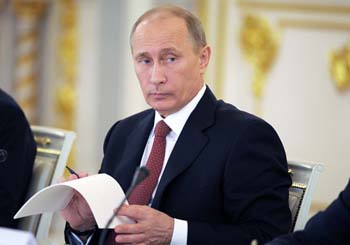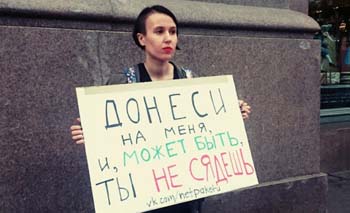By Michael Ireland

Following the collapse of the Soviet Union in 1991, the evangelical church in Russia enjoyed 25 years of freedom.
“Sadly, however, a new set of repressive laws known as the ‘Yarovaya package’ went into effect Wednesday, July 20, which threaten to eliminate these very freedoms,” Sergey Rakhuba, President of MISSION EURASIA, told ASSIST News.
In a media update Rakhuba says: “These laws are alarmingly similar to the 1929 Soviet law on religion that the Stalin administration used to unleash persecution against evangelicals, causing a catastrophe for millions.”
“Despite the protests of religious leaders, these laws were nevertheless signed by President Vladimir Putin. The collective prayers and appeals by evangelical Christians to the president went unheeded.”
“No longer will people feel safe sharing their faith with a neighbor or a passerby. Moreover, all communications providers, including the internet, will be subject to surveillance and censorship. Both individuals and religious organizations will be threatened with unbearable fines,” Rakhuba said.

“[It’s] the most draconian anti-religion bill to be proposed in Russia since Nikita Khrushchev promised to eliminate Christianity in the Soviet Union. For years we have watched as huge changes take place in Russia under the increasingly dictatorial rule of President Putin and his administration. Freedom of religion represents a threat to the current political agenda in Russia. Today, few—if any—foreign Christian mission groups have an official presence in Russia, having been pushed out by anti-evangelical regulations.”
Russian Church reacts as ‘anti-missionary bill’ becomes law
The new law, known more commonly as the “Yarovaya” law (the name of one of its authors), which went into effect on July 20, was formally introduced as an “anti-terrorism” measure, allowing the government to monitor extremist groups.
However, World Watch Monitor says its biggest impact may be upon Russia’s Christians, particularly missionaries, who will need a permit, and the so-called “house churches,” which will soon be deemed illegal, as religious activity will only be allowed to take place inside registered buildings, such as churches. Maximum fines amount to the equivalent of $780 for individuals or $15,000 for organizations.
World Watch Monitor says the law is unlikely to affect the Russian Orthodox Church, to which 70 percent of Russians subscribe, but it will affect all other evangelical groups and denominations.
Church reacts: A summary of reaction from the Church in Russia:
An open letter from the Baptist Council of Churches, says: The authors of the bill did not ask for the views of those “who are the most affected by the new amendments.” Instead, the law violates the constitutional right “freely to choose, hold, and disseminate religious and other beliefs.”
“[It will] create conditions for the repression of all Christians … Any person who mentions their religious views or reflections out loud or puts them in writing, without the relevant documents, could be accused of ‘illegal missionary activity’ and subjected to a heavy fine.”
Another letter, signed by, amongst others, Sergei Ryakhovsky, head of the Protestant Churches of Russia, says: “The obligation on every believer to have a special permit to spread his or her beliefs, as well as hand out religious literature and material outside of places of worship and used structures is not only absurd and offensive, but also creates the basis for mass persecution of believers for violating these provisions. Soviet history shows us how many people of different faiths have been persecuted for spreading the Word of God. This law brings us back to a shameful past.”
Joel Griffith of the Slavic Gospel Association, stated: “I understand from one source that this package of bills was actually drafted in April and it’s been back and forth through a few committees here and there so I’m imagining this has probably been well discussed behind the scenes … It’s been signed into law, now it’s all going to depend on how this gets interpreted down the food chain within the Russian Federation … There are potentially very wide-sweeping ramifications to this law. It just depends on, again, how it is going to be enforced and that is a very huge question mark … Our whole ethos and purpose is to serve the church. And the Russian Union of Evangelical Christians-Baptists is registered with them. And our sole purpose for existence is serving those churches.”
Jake Roudkovski, New Orleans Baptist Theological Seminary professor, commented: “Baptist churches in Russia will survive … [It] is nothing new to them … [But it] will significantly undercut all of the missionary activities [though it] will not stop [missions and evangelism] altogether.”
Jerry Johnson, President, National Religious Broadcasters, said: “Following a pattern of other human rights abuses, Vladimir Putin’s Russia is criminalizing a central duty for all followers of Christ — sharing our faith.”
Oleg Goncharov, Seventh-day Adventist Euro-Asia Division, member of Kremlin Advisory Council on Religious Organizations and Co-Chair of Protestant Churches in Russia, stated: “It is impossible for believers to comply with the requirements not to express their religious beliefs and to be silent even in their own homes as required by the legislation … The religious situation in the country will grow considerably more complicated and many believers will find themselves in exile and subjected to reprisals because of our faith …
“[It’s] a flagrant violation of fundamental human rights, of the inalienable right given to every person by their creator to express their religious convictions, and of rights enshrined in the Russian Constitution and international law … Russia has always been a multi-ethnic and multi-religious country that respects the rights and freedoms of every person regardless of his or her religion.
“[This will] put hundreds of thousands of believers from various denominations in a very difficult position … [The controls are] effectively legalizing the invasion of citizens’ privacy by forbidding them from expressing their religious beliefs or meeting their religious needs even at home … [It] forces citizens to join religious communities in order to exercise their inalienable right to freedom of conscience, which is a gross violation of the Russian Constitution and international law.”
Ganoune Diop, Public Affairs and Religious Liberty Department, Adventist World Church, commented: “What is at stake here is more than freedom of religion. It also includes the other fundamental freedoms: freedom of expression and freedom of assembly. All of these fundamental freedoms are interrelated, interdependent, and indivisible.”
Others react to the new law
Rev. Thomas J. Reese, United States Commission on International Religious Freedom (USCIRF), stated: “These deeply flawed anti-terrorism measures will buttress the Russian government’s war against human rights and religious freedom. They will make it easier for Russian authorities to repress religious communities, stifle peaceful dissent, and detain and imprison people.”
USCIRF statement: “The U.S. Commission on International Religious Freedom strongly condemns these measures. Under the guise of confronting terrorism, they … grant authorities sweeping powers to curtail civil liberties, including setting broad restrictions on religious practices that would make it very difficult for religious groups to operate.
“The Russian government uses its current anti-extremism law to target religious communities because the legal definition of extremism does not require the threat or use of violence. ‘Extremism’ charges can include the peaceful promotion of ‘the superiority of one’s own religion,’ and have resulted in religious texts being banned and members of non-violent Muslims groups and Jehovah’s Witnesses imprisoned.”
Gennady Gudkov, who is an opposition leader in the Russian parliament, commented: “This is an absolutely draconian law; even the Soviet Union did not have such an overwhelmingly repressive legislation. This is 100 per cent a step toward an Iron Curtain.”
Russia’s Presidential Council on Civil Society and Human Rights, said: “[Putin should reject the law because of the] unconstitutionality, contradictoriness and legal uncertainty of some of the legal norms contained in them.”
Eric Baxter, Becket Fund for Religious Liberty, commented: “[The law] is very restrictive on its face … Despite decades of enforced atheism under the USSR, in my experience the Russian people are people of deep faith. Religion inspired their art, their literature and their music, and I think that the natural human instinct to share their faith will prevail and Russians will find the freedom to live their faith.”
David Aikman, author and journalist, said: “The Russian Orthodox Church is part of a bulwark of Russian nationalism stirred up by Vladimir Putin. Everything that undermines that action is a real threat, whether that’s evangelical Protestant missionaries or anything else.”
For more information about the new repressive Russian law on religion, please contact: Mission Eurasia, P.O. Box 496, Wheaton, IL 60187; www.missioneurasia.org; Ph. (630) 462-1739



